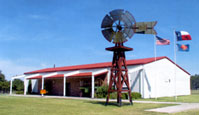|
November 17, 2013
WOLF CREEK HERITAGE MUSEUM NOTES by Virginia Scott MUSEUM HAPPENINGS The frame of the new building is going up starting today. So our new addition is going up fast. We still need funds to complete our costs so if you haven't donated or can donate more we would greatly appreciate your help. The Quanah Parker exhibit is still on display. There has been a lot of discussion locally about Quanah and his relationship with Charles Goodnight and other early ranchers. Come and visit this exhibit and learn more about Quanah the man, the Indian, and the Politician. He was a very interesting man. We are finishing our year and preparing the museum for our December vacation. Moving certain items and trying to complete our paperwork before the end of the year. I will be traveling to Amarillo on Tuesday to attend a seminar on fundraising so will have a report for our last column of the year. HISTORICAL MUSINGS Here is a little of Quanah biography: Quanah was a Native American Indian Leader, the son of Comanche chief Peta Nocona and European American woman Cynthia Ann Parker, and the last chief of the Quahadi Comanche Indians, a title bestowed on him by President T.R. Roosevelt. Quanah was the first born son of Cynthia Ann and Peta Nocona. Pecos (Peanut) was the second born son. A girl, Prairie Flower was the last child born. When Cynthia Ann and Prairie Flower were captured by Sul Ross and the Texas Rangers in the battle of Pease River, Peta Nocona and his sons were on a hunting trip and were not present at the battle. Peta Nocona grieved for his wife and child. he was later wounded on a raid with Apaches. Already in ill-health, with an older war wound troubling him, he soon died. Before his death, he told Quanah of his mother's capture from the whites. With Nocona's death, his band split. Quanah joined the Destanyuka ban, where Chief Wild Horse took him under his wing. He soon left Destanyuka and formed the Quahadi (Antelope Eaters) band with warriors from another tribe and led them successfully for a number of years. Come see us for more |
 |
© 2006 - 2025 Wolf Creek Heritage Museum
All Rights Reserved |


